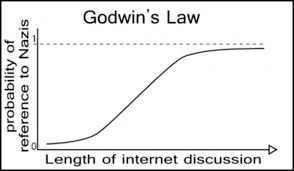If you thought the crazed despot, Adolf Hitler, was long dead, you’re right, but you’re also wrong. Today he’s alive and well, although not in Germany – e’s much more global than that – for it’s the internet where he lives now.
Collective memory
When I say lives, I should probably clarify that by saying ‘is mentioned’, because it’s the concept of the man, his ideology, and his narrative that people tend to refer to when referencing him. His name is now a byword for racial hatred, destruction, oligarchy, you name it. Just like how using the name Mozart for describing any present day child-genius ensures the long-dead 18th century composer stays alive in our collective memory, ‘Hitler’ seems to be the man most people want to compare anything regarded as evil against. For, just now, he is mentioned a lot! Especially when mentioned alongside Donald Trump.
Mexican President Enrique Peña Nieto, has compared Donald Trump to Hitler. Abraham Foxman, former national director of the Anti-Defamation League, thinks Trump behaves like Hitler. Even pop star Cher thinks Trump acts like Hitler.But let’s just pause for a moment. Whatever your personal opinion about this democratically elected US president, you’ve got to admit it’s pretty strong stuff. Some suggest it’s downright wrong to even make such links, trivialising (as it does), the very real deaths of millions of people. Last time I checked, Trump hadn’t done anything like what Hitler did.
But, here’s the point. What we see online is not (mostly) people literally thinking Trump is the second-coming of this evil man, but it’s more a reference to how bad things could get if we’re not careful. As such Hitler has developed a very wide frame of usage – everything from being described as a unit of measurement, to the amount of time it has taken governments to reach agreement on something (‘We defeated Hitler faster than we took to decide…’).
This tendency to compare all that’s bad with the world to Hitler was first observed by American attorney and author Mike Godwin in 1990, and he’s now been bestowed with creating what’s now known as ‘Godwin’s Law’ – the tendency for any online discussion to, sooner rather than later, eventually make some sort of analogous reference to the German Nazi Party leader. According to Godwin, it’s not a case of ‘if’ such references will be made, but ‘when’.
When conversations overstep the mark
As the founder of a business interested in conversations, I can’t help being interested and fascinated by this law in equal amounts. It demonstrates cyberpolarisation at its most obvious, and it challenges how we need to react to, and understand human sentiment.
Don’t get me wrong, the internet is great for having people interact with each other, it’s brilliant for all sorts of reasons – but Godwin’s law means we must all be aware of when conversation may overstep the mark, or when they start to differ from real-life. It demonstrates how online conversations are both a great way of engaging people, about getting their real thoughts about issues in an unedited, uncurated way, but also how things can veer away from reality quite quickly.
If Godwin’s law teaches us anything, it’s that we all need to understand that the nature and end result of encouraging online discussion isn’t always a broad-church of well-thought out views and opinions we think it should be. The very real fact is, that it’s almost second-nature for discussion to head down very different cul-de-sacs, and from this, the content and opinions shared can be ever more extreme.
It’s not to say polarised opinion is always a bad thing – because what you can learn from it can also tell you a lot. But what I do think is that we must all remember that sometimes an online discussion can transform and boil down into very blunt comparisons. Hitler might not be a name many of us like or want to hear, but with social media as it is, it will be a name we’ll continue to be reading about for some considerable time yet.


